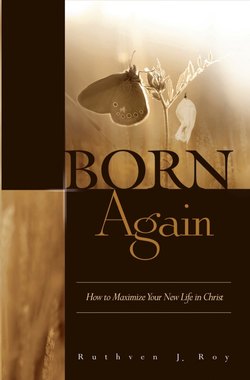Читать книгу Born Again: How to Maximize Your New Life In Christ - Ruthven Roy - Страница 8
На сайте Литреса книга снята с продажи.
Doomed for Destruction
ОглавлениеFor the wages of sin is death . . . Romans 6:23
Truth Nugget #3: Humanity cannot change itself or its course towards eternal destruction without deliverance from heaven.
Because of Adam’s sin, life on planet earth became a slow, painful, death-march to eternal destruction; and humanity can neither change itself nor its destructive course without divine help. The Bible confirms that all the living know that they shall die (Ecclesiastes 9:5). However, the ultimate effect of Adam’s deadly misstep at the dawn of Creation is the two un-avoidable appointments it has imposed upon all his descendants—death and judgment regarding our eternal destiny.
And as it is appointed unto men once to die, but after this the judgment:
Hebrews 9:27
With all its noblest intentions, intelligence and creativity, human-kind is totally powerless to handle the sin problem, along with its natural or eternal consequences. A man’s best effort to change himself is an act in total futility and frustration. Through His prophet Jeremiah, God asked and answered the very poignant question: Can the Ethiopian change his skin or the leopard its spots? Neither can you do good who are accustomed to doing evil (Jeremiah 13:23, NIV). Understanding the plight of man’s condition before God, the prophet uttered the plaintive plea:
O LORD, I know that the way of man is not in himself: it is not in man that walketh to direct his steps. 24O LORD, correct me, but with judgment; not in thine anger, lest thou bring me to nothing.
Jeremiah 10:23, 24
Additionally, the Holy Scriptures affirm that there is a way that seems right to a man, but in the end it leads to death (Proverbs 16:25, NIV). The apostle Paul expressed this frustration before he experienced the power of the living Christ in his life.
For we know that the Law is spiritual, but I am of flesh, sold into bondage to sin. 15For what I am doing, I do not understand; for I am not practicing what I would like to do, but I am doing the very thing I hate. 16But if I do the very thing I do not want to do, I agree with the Law, confessing that the Law is good. 17So now, no longer am I the one doing it, but sin which dwells in me. 18For I know that nothing good dwells in me, that is, in my flesh; for the willing is present in me, but the doing of the good is not.
19For the good that I want, I do not do, but I practice the very evil that I do not want. 20But if I am doing the very thing I do not want, I am no longer the one doing it, but sin which dwells in me. 21I find then the principle that evil is present in me, the one who wants to do good. 22For I joyfully concur with the law of God in the inner man, 23but I see a different law in the members of my body, waging war against the law of my mind and making me a prisoner of the law of sin which is in my members.
24Wretched man that I am! Who will set me free from the body of this death?
Romans 7:14-24
What Paul describes in the above scriptural verses is the utter human helplessness in dealing with the sin condition—the never-ending, ever-losing battle between a person’s will to do good, and the resident sin that drives him to do evil instead. This stupor-like experience often leaves the sinner in a state of puzzling defeat and helpless resignation to the cravings of his sinful nature.
